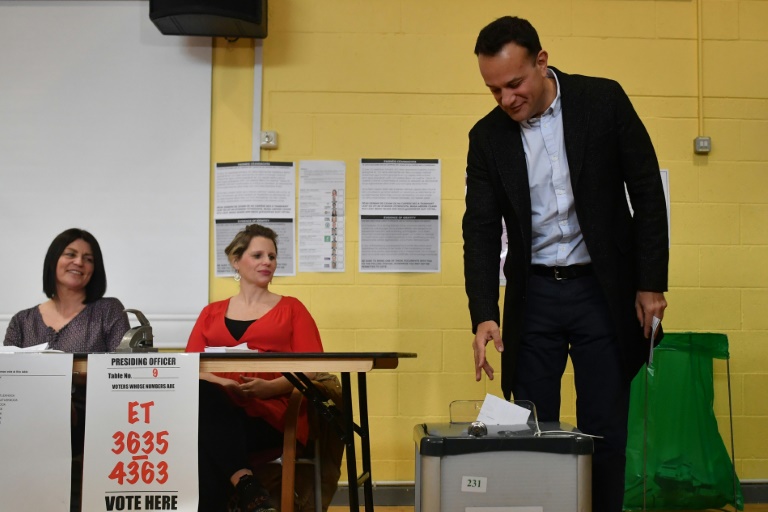
Ireland's Prime Minister and leader of the Fine Gael party party Leo Varadkar cast his vote on the outskirts of Dublin. (Photo: AFP)
Irish voters cast their ballots on Saturday with Prime Minister Leo Varadkar hoping to secure a new term on the back of his Brexit strategy, but polls put his Fine Gael party behind rivals Sinn Fein and Fianna Fail.
Polls opened at 0700 GMT, although a small number of islands off the west coast voted on Friday to allow for rough seas potentially disrupting the transport of ballots by boat.
Varadkar, whose party has been in power since 2011, cast his vote on the outskirts of Dublin, seeming in a relaxed mood as he chatted with officials and posed for selfies with voters.
His Fine Gael party has been in power since 2011 but polling suggests they are trailing left-wingers Sinn Fein -- the former political wing of the now-defunct Irish Republican Army paramilitary group -- and centre-right rivals Fianna Fail.
In Monday's final opinion poll, Sinn Fein were in front on 25 percent, with Fianna Fail on 23 percent and Fine Gael on 20 percent.
In Dublin, a stream of voters made their way to polling stations.
Liam Allen, 27, said housing was a "big concern" for him.
"I still live at home with my parents and for the foreseeable future I won't be able to afford a home," he told AFP.
Nurse Terry Sanor said: "I'm hoping that the health service will improve, and the waiting list, and the pay for the nurses and the housing."
The centre-right Fine Gael and Fianna Fail parties have traditionally held a duopoly on power.
"I'm hopeful there will be change. In this country, for far too long it's been dominated by two parties," said 60-year-old James Comiskey.
Alexander Faw, 22, said: "I'm looking for a more left government of Ireland."
- FF leader 'confident' -
Some 3.3 million people are eligible to vote to elect 159 members of the Dail, the lower chamber of parliament in Dublin.
A single transferable vote system is used to elect multiple members from 39 constituencies.
Fianna Fail leader Micheal Martin, 59, voted with his family in his Cork city constituency.
"We are very confident. We had a good campaign," he told reporters outside the polling station.
"Housing and health and the impact of the cost of living on people have been the dominant issues of this campaign."
Sinn Fein leader Mary Lou McDonald voted in central Dublin.
"People have told us throughout this campaign that they want change," the 50-year-old told reporters outside the polling station.
"They want a change in representation and they want a change in government."
Varadkar plumped for an early election after successfully helping to broker a deal cushioning Britain's EU exit on January 31 by avoiding a hard border with Northern Ireland, part of the United Kingdom.
But experts suggest he may have miscalculated the public mood, with surveys indicating Brexit was a low concern among the electorate.
Other parties have hammered Fine Gael over failings in health care, housing and homelessness.
"This election is wide open," Varadkar admitted at his final campaign stop in the western town of Ennis on Friday.
"It's a three horse race: three parties all within shouting distance of each other."
- Domestic woes -
In office since June 2017, Varadkar, 41, is Ireland's first mixed-race and openly gay premier who has come to represent a more socially progressive Ireland after years of dominance by the Roman Catholic church.
But despite Brexit, and landmark votes to overturn strict abortion laws and introduce same-sex marriage, some predict he could be on his way out.
"Varadkar is young, he's gay, he looks like part of the new Ireland," Eunan O'Halpin, of Trinity College Dublin, told AFP.
"Yet his personal popularity appears to have dipped, and that of his party has dipped very significantly."
Polls close at 2200 GMT and votes start being counted at 0900 GMT on Sunday.
Despite its opinion poll lead, Sinn Fein is not fielding enough candidates to form a majority government, while both Fine Gael and Fianna Fail have ruled out working with them in coalition.
Since 2016, Fianna Fail have propped up Fine Gael in office with a confidence and supply arrangement that could implicate them in the perceived failings of the government.


